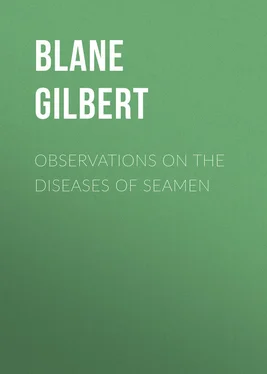Gilbert Blane - Observations on the Diseases of Seamen
Здесь есть возможность читать онлайн «Gilbert Blane - Observations on the Diseases of Seamen» — ознакомительный отрывок электронной книги совершенно бесплатно, а после прочтения отрывка купить полную версию. В некоторых случаях можно слушать аудио, скачать через торрент в формате fb2 и присутствует краткое содержание. Жанр: foreign_antique, foreign_prose, на английском языке. Описание произведения, (предисловие) а так же отзывы посетителей доступны на портале библиотеки ЛибКат.
- Название:Observations on the Diseases of Seamen
- Автор:
- Жанр:
- Год:неизвестен
- ISBN:нет данных
- Рейтинг книги:3 / 5. Голосов: 1
-
Избранное:Добавить в избранное
- Отзывы:
-
Ваша оценка:
- 60
- 1
- 2
- 3
- 4
- 5
Observations on the Diseases of Seamen: краткое содержание, описание и аннотация
Предлагаем к чтению аннотацию, описание, краткое содержание или предисловие (зависит от того, что написал сам автор книги «Observations on the Diseases of Seamen»). Если вы не нашли необходимую информацию о книге — напишите в комментариях, мы постараемся отыскать её.
Observations on the Diseases of Seamen — читать онлайн ознакомительный отрывок
Ниже представлен текст книги, разбитый по страницам. Система сохранения места последней прочитанной страницы, позволяет с удобством читать онлайн бесплатно книгу «Observations on the Diseases of Seamen», без необходимости каждый раз заново искать на чём Вы остановились. Поставьте закладку, и сможете в любой момент перейти на страницу, на которой закончили чтение.
Интервал:
Закладка:
There is a tendency in acute diseases to wear themselves out, both in individuals that labour under them, and when the infection is introduced into a community. Unless there was such a vis medicatrix , there could be no end to the fatality of these distempers; for the infectious matter would go on multiplying itself without end, and would necessarily destroy every person who might be actually attacked, and would infect every person who might be exposed to it. But animal nature is so constituted, that this poison, after exciting a certain set of motions in the body, loses its effect, and recovery takes place; and those who happen not to be infected at first, become in some measure callous to its impression, by being habitually exposed to it. There is, therefore, a natural proneness to recovery, as well with regard to that indisposition which takes place among a set of men living together, as with regard to a single individual who actually labours under the disease. Thus the most prevailing period of sickness is when men are new to their situation and to each other, so that time of itself may prove the means of prevention as well as of cure.
This consideration, however, ought not to supersede any part of our attention with regard to the scurvy, which does not become spontaneously extinct like acute diseases.
During the three first weeks of this passage from England to the West Indies, there was wet and boisterous weather, but it had very little effect in augmenting sickness; and though it not only subjected the men to fatigue, cold, and damp, but prevented the ships from opening their lower-deck ports till the 2d of February, between the 31st and 32d degree of latitude, thereby producing close air and moisture where the men sleep, yet, in the whole squadron, from its leaving England till this time, there were only seven deaths, four of which were in the Fame.
The only sea epidemic that made its appearance was the infectious ship fever, which, in many cases, was attended with pleuritic, rheumatic, and other inflammatory symptoms, owing to the cold and wet, to which the men were exposed in the variable latitudes. The warm, dry, fresh breezes which we had during the remainder of the passage, were probably what prevented any bad consequences from the former hardships, for there died only four men from the above-mentioned date till we arrived at Barbadoes; and it appeared by the Admiral’s weekly account, that the proportion of the sick neither increased nor diminished from the time we got into a warm climate and fine weather till our arrival on the 19th of February.
This squadron left England with several advantages in point of victualling, which no ships had before enjoyed. They were amply supplied with sour crout and melasses; they had all more or less wine, of an excellent quality; and the Formidable had an entire supply of it, in place of spirits, of which none was put on board. This slip had hitherto, and did for some months afterwards, enjoy an extraordinary, perhaps an unparallelled, degree of health. What farther contributed to the health of this ship was, that she had been long in commission, and most of the recruits with which the crew had been completed were men turned over from other ships. There was also extraordinary medical attention paid, particularly in watching the first beginnings of complaints.
Upon the arrival of the squadron at Barbadoes, it was found, that, the two hostile fleets having returned from North America in the beginning of December, the campaign had opened with the siege of St. Christopher’s, which had been invested by twenty-eight ships of the line, and a considerable army. Our fleet, under Lord Hood, having attempted, with great enterprise and skill, but without success, to relieve it, Lord Rodney made haste to join them with the reinforcement he had brought from England. He remained at anchor at Barbadoes only one night, and in a few days came off Antigua, where he was informed of the surrender of St. Christopher’s; and here, on the 25th of February, he was joined by the rest of the fleet in their return to windward.
CHAP. II
Account of the Health of the Fleet from the Junction of the Squadron from England, till the general Rendezvous at St. Lucia in the Beginning of April. – The Fleet found on the Station very healthy – Health of the Ships from the American Station – Health of the Ships from England compared with that of the Ships found on the Station – Small-pox prevalent – Instance of the remarkable Efficacy of Lemon Juice in curing the Scurvy – Additional Reinforcement from England – Watering Duty dangerous and unhealthy – The most healthy Ships those that had been longest in the Climate – List of the Numbers taken ill of each Complaint in March – Inflammation of the Liver not common in the West Indies.
The fleet which was found in the West Indies consisted of all the sixteen that went from thence to America in August, 1781, (except the Terrible, which had been lost) together with six ships of the line 8from the American station, the St. Albans, which arrived from England in November, and the Russel, which had remained in the West Indies during the hurricane months. They were all extremely healthy, having only one man in twenty-eight on the sick list, and very few had been sent to hospitals.
This fleet, after arriving from America, had lain at anchor for three weeks at Barbadoes, where it had the advantage of the vegetable refreshments which that island affords; but during three weeks that it lay at anchor, in the face of the enemy, at St. Christopher’s, the men were excluded from all communication with the shore, and had no vegetable food, except some yams, with which they were supplied from Antigua, in place of biscuit, of which there was at this time a scarcity. These ships had therefore been in no port for six weeks, except for a few days that they lay in the road of Antigua refitting, and putting the sick and wounded on shore.
The men had also been deprived of their natural rest, and exposed to the air during all the time that the fleet was at anchor before St. Christopher’s; for they had been twice attacked by the enemy in that situation, and were therefore under the necessity of keeping the ships constantly clear for action; yet no increase of sickness followed. This might partly be owing to the eagerness and alacrity of spirits naturally excited in such a situation, and also to the fleet not lying under the lee of any land, and having springs upon their cables, so that they had all the perflation and all the purity of air which ships enjoy when at sea. The fumigation which ships undergo in battle, has also been thought to contribute to their health.
To whatever cause it was owing, the fleet we found in the West Indies was at this time healthier than that which had just come from England; and there was but little difference in the degree of health of the different ships that composed it. Of those which left the West Indies in August, and returned in December, the only one that could be said to have any epidemic disease was the Prince William, which had never got entirely free from the dysentery that was formerly mentioned as prevailing so much on board of this ship last year. The disease was kept up, by the ship never having been cleared of the men affected with it, and by the crew in general being ill provided with slops 9, a circumstance that would render them more susceptible of whatever infection they might be exposed to.
There were also some remains of the same disease in the Intrepid, the seeds of it having been more or less continued from the summer of 1780, at which time it prevailed to a most violent degree. The Alfred had a few of all the sea epidemics, and had been for a long time before more or less in the same situation, from a neglect of cleanliness, particularly of the men’s persons.
Читать дальшеИнтервал:
Закладка:
Похожие книги на «Observations on the Diseases of Seamen»
Представляем Вашему вниманию похожие книги на «Observations on the Diseases of Seamen» списком для выбора. Мы отобрали схожую по названию и смыслу литературу в надежде предоставить читателям больше вариантов отыскать новые, интересные, ещё непрочитанные произведения.
Обсуждение, отзывы о книге «Observations on the Diseases of Seamen» и просто собственные мнения читателей. Оставьте ваши комментарии, напишите, что Вы думаете о произведении, его смысле или главных героях. Укажите что конкретно понравилось, а что нет, и почему Вы так считаете.












